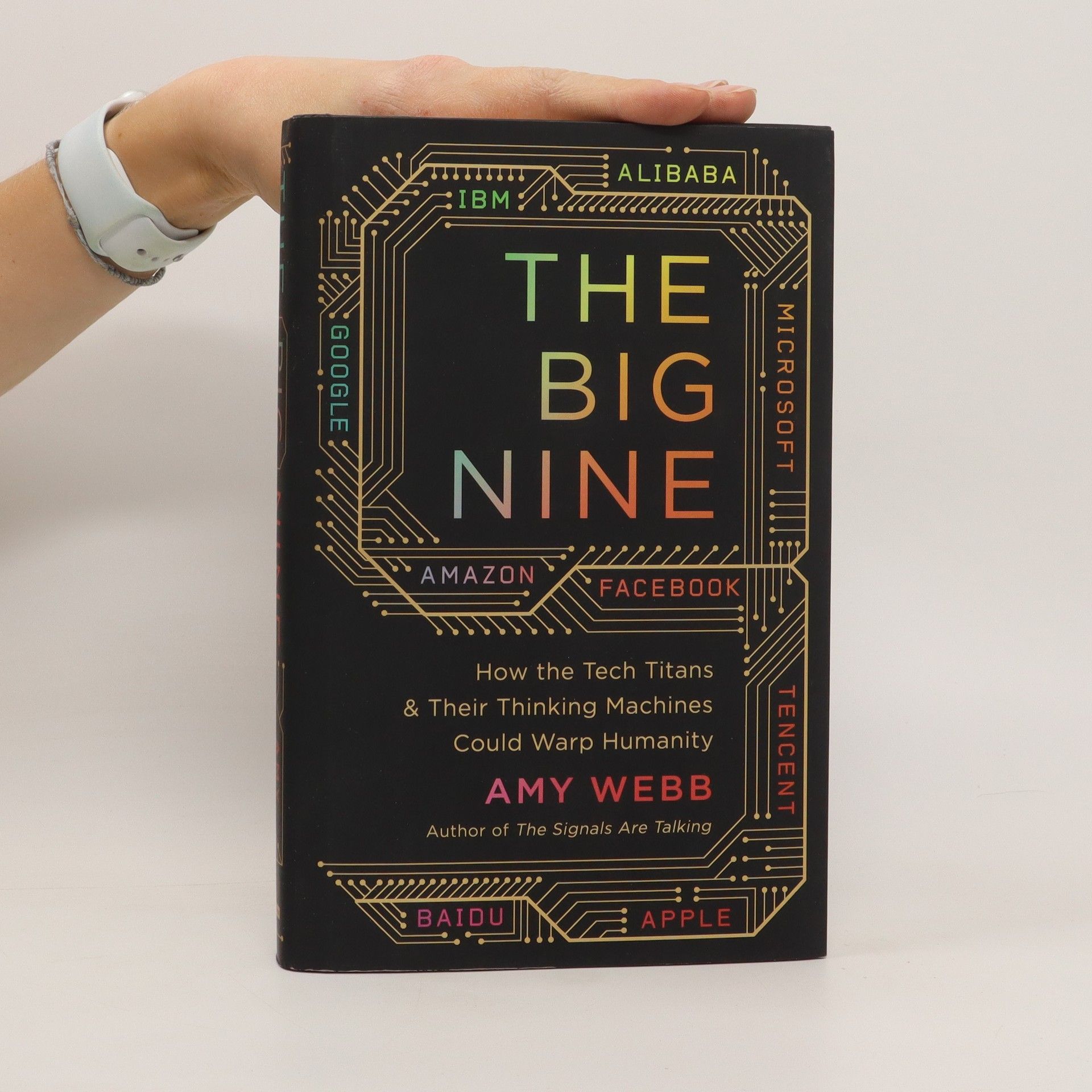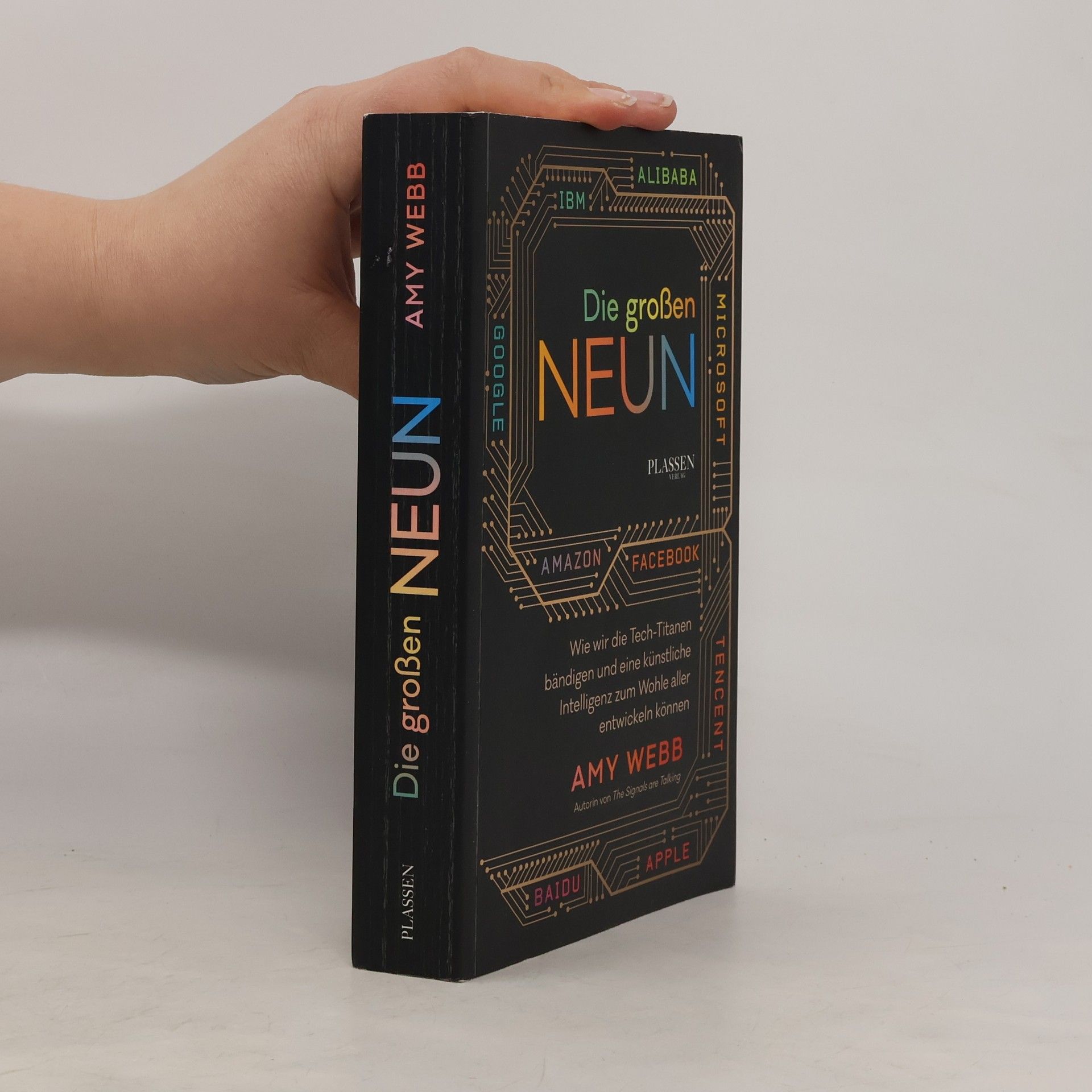When she encounters problems that diminish her enjoyment of a class field trip to a local art museum, Emma calls on her inner sense of awesome to stand up for herself and teach her friend Charley how to feel comfortable in his own skin.
Amy Webb Livres
Amy Webb est une futuriste et auteure renommée dont les œuvres analytiques explorent les tendances technologiques actuelles et futures. Son écriture examine de manière critique l'impact profond de l'intelligence artificielle et le pouvoir croissant des entreprises technologiques sur l'humanité. Webb étudie l'évolution de la relation entre les humains et les machines, avertissant des risques potentiels que ce changement représente pour notre société. Grâce à sa recherche et à son écriture, elle vise à doter les dirigeants et le public des moyens nécessaires pour relever les défis futurs complexes et élaborer des stratégies pour un monde en constante évolution.






Synthetic biology merges biology and artificial intelligence, allowing us to program biological systems similarly to computers. This technology goes beyond merely reading and editing DNA with CRISPR; it enables us to write DNA, potentially controlling our genetic fate. It offers the ability to reject harmful genes and create a genetic app store for enhancing any living organism. Webb and Hessel share captivating stories about advancements such as indoor farms capable of feeding millions with minimal resources, self-regulating insulin that eliminates the need for injections, personalized regenerative medicine, and innovative solutions to climate change. They also touch on the whimsical notion of "unextincting" the woolly mammoth. The authors delve into the ethical, moral, and religious implications of synthetic biology, highlighting the risks of misuse that could exacerbate societal divides between the enhanced and the non-enhanced. They address critical questions regarding the programming of viruses to combat diseases, genetic privacy, ownership of engineered organisms, revenue generation from modified cells, and containment of synthetic organisms. As synthetic biology advances, understanding its potential benefits and dangers becomes essential. Webb and Hessel provide insights into both the scientific and societal dimensions of this emerging field.
The big nine. How the tech titans and their thinking machines could warp humanity
- 336pages
- 12 heures de lecture
A call-to-arms about the broken nature of artificial intelligence, and the powerful corporations that are turning the human-machine relationship on its head. We like to think that we are in control of the future of "artificial" intelligence. The reality, though, is that we--the everyday people whose data powers AI--aren't actually in control of anything. When, for example, we speak with Alexa, we contribute that data to a system we can't see and have no input into--one largely free from regulation or oversight. The big nine corporations--Amazon, Google, Facebook, Tencent, Baidu, Alibaba, Microsoft, IBM and Apple--are the new gods of AI and are short-changing our futures to reap immediate financial gain. In this book, Amy Webb reveals the pervasive, invisible ways in which the foundations of AI--the people working on the system, their motivations, the technology itself--is broken. Within our lifetimes, AI will, by design, begin to behave unpredictably, thinking and acting in ways which defy human logic. The big nine corporations may be inadvertently building and enabling vast arrays of intelligent systems that don't share our motivations, desires, or hopes for the future of humanity. Much more than a passionate, human-centered call-to-arms, this book delivers a strategy for changing course, and provides a path for liberating us from algorithmic decision-makers and powerful corporations.
2020 Tech Trend Report
Strategic trends that will influence business, government, education, media and society in the coming year
- 368pages
- 13 heures de lecture
Focusing on emerging trends, this report highlights 400 significant developments across 31 industries poised to disrupt business, geopolitics, and daily life. It provides in-depth analysis, strategic recommendations, and identifies business opportunities alongside detailed risk assessments. Additionally, the report presents 26 future scenarios, offering insights into potential outcomes and strategies for navigating the evolving landscape.
The Signals Are Talking
- 336pages
- 12 heures de lecture
The renowned futurist's powerful methodology - tested and pragmatic - for anticipating trends, seeing the future, and making better informed decisions in the wake of ever-faster disruption
Emma, the heroine from When Charley Met Emma and Awesomely Emma, return--this time going to an accessible summer camp!
Przyszłość, w której technologia przenika do wnętrza naszych ciał, staje się rzeczywistością dzięki biologii syntetycznej. Ta rewolucyjna dziedzina zmienia sposób diagnozowania chorób, przeciwdziałania starzeniu, budowy domów, rozmnażania i produkcji żywności. Wykorzystując komputery do modyfikacji DNA, osiągnięto przełomowe rozwiązania, takie jak szczepionki mRNA czy laboratoryjne mięso. W nadchodzącej dekadzie będziemy w stanie programować żywe komórki, co pomoże nam stawić czoła globalnym wyzwaniom, jak choroby, zmiany klimatu czy niedobory żywności. Autorzy analizują fuzję biologii i technologii, wskazując na nowe możliwości, takie jak personalizowane leki czy mięso bez zabijania zwierząt. Książka omawia również etyczne dylematy związane z projektowaniem życia oraz potencjalne scenariusze przyszłości, w tym wpływ na długość życia ludzi i rozwój biogospodarki. Czytelnik dowie się, jak szybko można kontrolować swoje genetyczne przeznaczenie, jakie firmy mogą dominować w biotechnologii oraz jak wirusy mogą stać się sojusznikami. Biologia syntetyczna ma potencjał do transformacji ludzkości, a decyzje, które podejmiemy dziś, będą miały dalekosiężne konsekwencje. Książka jest obowiązkową lekturą dla tych, którzy chcą zrozumieć kierunek, w jakim zmierza nasza rzeczywistość.
Die Neuentdeckung der Schöpfung
Wie (unser) Leben durch synthetische Biologie neu definiert wird
Was fällt Ihnen spontan zu „Synthetische Biologie“ ein? Wenn Sie kein Spezialist sind, dann lautet die Antwort sehr wahrscheinlich: „Nichts!“ Synthetische Biologie ist die neueste Entwicklung moderner Biologie. Sie zielt darauf, biologische Systeme – also Moleküle, Zellen oder Organismen – zu erzeugen, die so in der Natur nicht vorkommen. Im Ergebnis kann DNA nicht mehr nur dekodiert oder beeinflusst werden – sie kann geschrieben werden. Bestsellerautorin und Zukunftsforscherin Amy Webb veranschaulicht in ihrem neuen Buch die immensen Chancen, die diese Technologie für Gesundheit, Ernährung und viele andere Bereiche des täglichen Lebens bietet. Sie widmet sich aber auch den gesellschaftlichen, ethischen und religiösen Fragen, die dieser weitere Schritt hin zur Kontrolle unseres Lebens mit sich bringt.
Die großen Neun
Wie wir die Tech-Titanen bändigen und eine Künstliche Intelligenz zum Wohle aller entwickeln können
Die „großen Neun“ haben eines gemeinsam: Sie alle treiben mit Macht die Entwicklung künstlicher Intelligenz (KI) voran – und dieses Thema polarisiert: Entweder ist KI der Heilsbringer schlechthin oder aber eine tödliche Gefahr für die Menschheit. Doch wie heißt es so schön? Die Wahrheit liegt irgendwo dazwischen. Futuristin und Bestsellerautorin Amy Webb macht sich auf die Suche nach der Wahrheit. Sie erklärt unter anderem, weshalb wir KI nicht gigantischen Tech-Konzernen und auch nicht einzelnen Weltmächten wie China überlassen dürfen. Sie zeigt auf, was Politik, Wirtschaft und jeder von uns tun kann, damit künstliche Intelligenz sich am Ende nicht als Fluch, sondern als Segen herausstellt.
